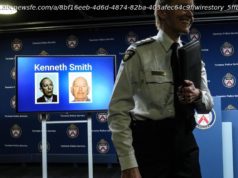Graham Spanier and two former university administrators will serve months in jail for attempting to conceal allegations of sexual abuse.
Former Pennsylvania State University President Graham Spanier received a minimum sentence of two months in jail, followed by two months of house arrest, on Friday after failing to report a 2001 allegation that the university’s ex-assistant football coach, Jerry Sandusky, had sexually abused a young boy. Despite his refusal to plead guilty, Spanier was convicted of child endangerment, a misdemeanor, on March 24. The maximum sentence he could serve is 12 months.
Spanier’s colleagues, former Penn State Athletic Director Tim Curley and former Senior Vice President for Finance and Business Gary Schultz, received the same conviction on Friday after accepting a plea deal on March 13. Both Schultz and Curley could serve a maximum sentence of 23 months, with Schultz serving at least two months in jail and Curley serving at least three. Like Spanier, both men could serve an additional sentence on house arrest. Curley and Schultz also owe the court $5,000, while Spanier was charged with a $7,500 fine.
Their sentencing marks the end of a lengthy court process, beginning in 2012 when an external investigation concluded that the three administrators had concealed Sandusky’s abuse from authorities, the Penn State Board of Trustees, and the university community. Spanier’s trial in particular centered on testimony from Mike McQueary, a former coaching assistant, who claimed he saw Sandusky sexually abusing a boy in a football team shower in 2001, and later reported the incident to the university’s former head football coach, Joe Paterno. Notes and email exchanges have since revealed that Curley, Spanier, and Schultz debated what to do with McQueary’s information, but opted to keep it hidden. For his part, Spanier claimed he did not know the allegations were sexual in nature.
According to the court’s sentencing memorandum, Spanier was “presented with information about Jerry Sandusky’s bad behavior in 1998 and again in February 2001, ” but feared the incident might damage his reputation. “Spanier needs to be punished for choosing to protect his personal reputation and that of the university instead of the welfare of children, ” the sentencing reads, adding that “Spanier has shown a stunning lack of remorse for his victims.” State prosecutor Laura Ditka also called Spanier “a complete and utter failure as a leader when it mattered most.” While Spanier expressed his deep regret that he “didn’ t intervene more forcefully” in 2001, his sentencing argued that “remorse without taking accountability is not remorse.”
Both Curley and Schultz also shared their regret at Friday’s sentencing. “I am very remorseful I did not comprehend the severity of the situation, ” Curley said. “I sincerely apologize to the victims and to all who were impacted because of my mistake.” Schultz added: “It really sickens me to think I might have played a part in children being hurt. I’ m sorry that I didn’ t do more, and I apologize to the victims.”
Friday’s sentencing also hinted that Joe Paterno, who passed away in 2012, could have faced similar charges were he still alive. During the sentencing, Judge John Boccabella remarked that Paterno “could have made a phone call without so much as getting his hands dirty. Why he didn’ t is beyond me.” While Paterno was never charged with a crime, he was the subject of widespread scrutiny in the wake of the abuse allegations. In July 2012, a mere months after the Sandusky scandal broke, the National Collegiate Athletic Association vacated Penn State’s victories from 1998 to 2011,111 of which were coached by Paterno. The day after he was fired, Paterno was quoted as saying, “I have spent my whole life trying to make [my] name mean something. And now it’s gone.”
Sandusky, meanwhile, continues to maintain his innocence. He is currently appealing a 30 to 60-year prison sentence after being convicted in 2012 of sexually abusing ten boys. At least four of the victims said they were molested after 2001, leading the court to argue that negligence on behalf of Curley, Spanier, and Schultz allowed Sandusky to continue his abusive behavior.






